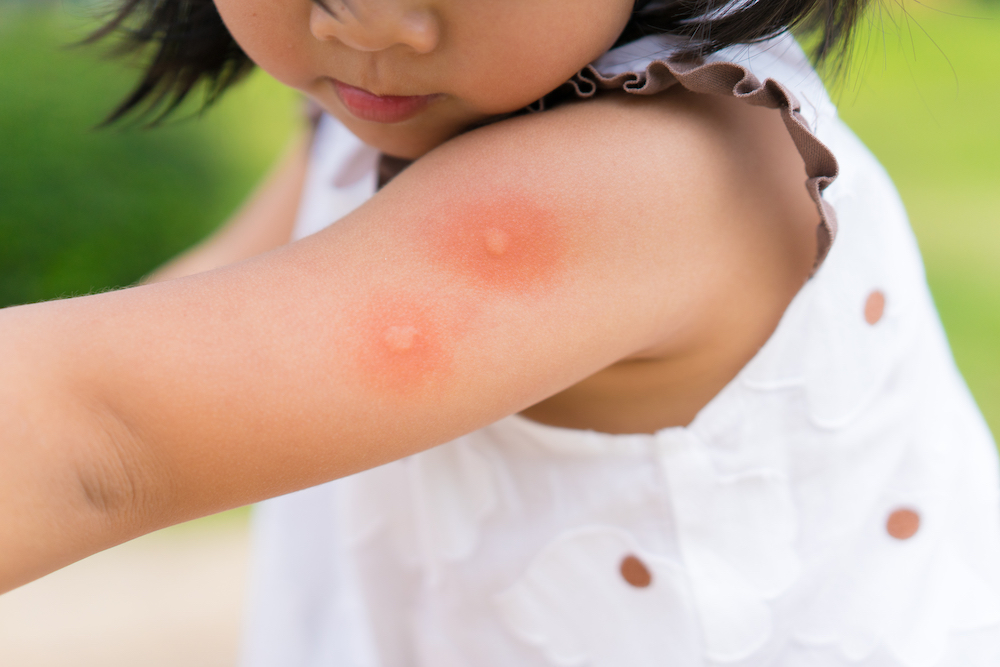Mosquitoes, biting flies, and ticks can make kids (and adults) miserable! Insect bites happen
more commonly during the summer, especially from mosquitoes. They can cause a great deal of discomfort, irritation, and even pain. In a few cases, they can also cause serious illness, like
Lyme disease which is transmitted from ticks. We know bug bites are annoying! So we have
some tips for you to follow to ensure a comfortable and safe summer for you and your kids.
One of the best ways to protect your children is to use an insect repellent that has been registered by the Environmental Protection Agency (EPA). We recommend checking out this search tool to find the right one for your family. Note that the most effective repellents contain DEET. The higher the concentration of DEET is, the longer protection it will provide. 10% DEET provides about 2 hours of protection and 30% provides about 5 hours of protection. Choose the lowest concentration that will be effective based on the amount of time your child will be outside. If you know you will be out for an hour, for an example, choose a product with 10% DEET. Increase the DEET percentage if spending a longer time outside.
Bug sprays that have more than 30% DEET do not provide longer protection, however, and greater than 30% DEET is not recommended to be used on children. It is also helpful to use sprays that contain picaridin which is particularly effective for repelling mosquitoes. Using a concentration of 20% can protect your family for 8 to 12 hours. Premethrin-containing products are most effective against ticks. But, it’s important to know that they should NOT be applied to skin directly but to clothing instead.
Insect repellents only protect against biting insects and not stinging ones such as bees, wasps and hornets. They should be applied only on exposed skin (not under clothing) and to the outside of your child’s clothing. Using more of the product does not make the repellent more
effective. Another thing to be aware of when it comes to insect repellents is to avoid products
that are combined with sunscreen. These products can overexpose your child to DEET as
sunscreen needs to be reapplied every 2 hours.
We always advise following the directions carefully on the repellent products and read any warnings. Never apply insect repellent to a child younger than 2 months of age. Be extra cautious and conservative with the amount you use for children under 2 years old. It is best to apply the repellent on young children until they’re old enough to do it on their own. And even for older children, it is recommended that they are supervised.
When applying the repellent to your child’s face, do not spray directly as it can get into their eyes or mouth. Instead, spray it on your hand and then rub the product on their face. Make sure to avoid the eyes and mouth, as well as any cuts or wounds since the spray can cause them to sting. Wash your child’s skin with soap and water to remove any repellent
when they return indoors, and clean their clothes before they wear them again. If your child
develops any negative reaction to the spray, discontinue use immediately and wash their skin
with soap and water. Call Poison Help at 1-800-222-1222 for assistance if and when needed.
Aside from repellents, dressing your children in lightweight clothes that cover most of the skin
and hats can also keep them safe from insects. To protect babies, consider
putting a mosquito net over their stroller whenever you are in areas where there are a lot of
mosquitoes. Encourage your children to stay away from garbage cans, stagnant pools of water,
or flower beds as insects often congregate there. You’ll also want to keep the door and window screens in good repair and avoid the use of scented perfumes, lotions, etc. on your child as these can attract insects.
If your child gets a bite from a tick and the tick stays attached to the skin, it is important to
remove the tick immediately. You can do so with a pair of tweezers. Hold the tweezers sideways to the skin and grasp the tick to pull it upwards. After the tick is removed, wash the wound with soap and water. You can then apply an over-the-counter antibiotic ointment. Check your child’s skin at the end of each day if you live in an area where ticks are present and your child has been playing outdoors. If your child experiences a rash or fever from a tick bite or any other insect bite, call our office right away.
MYTHS!
The following types of products are not effective for repelling insects: wristbands soaked in chemical repellents, garlic or Vitamin B taken by mouth, ultrasonic devices that give off sounds waves and designed to keep insects away, bird or bat houses, and backyard bug zappers (insects may actually be attracted to your yard!).




